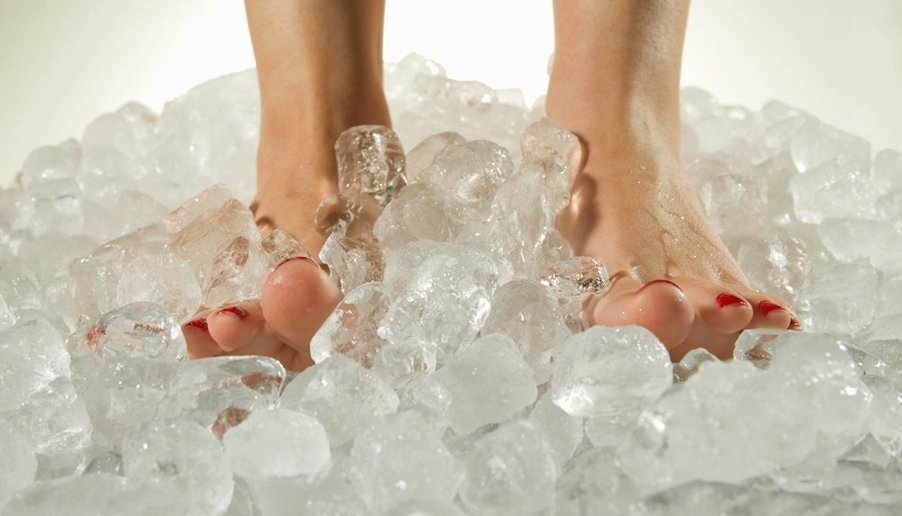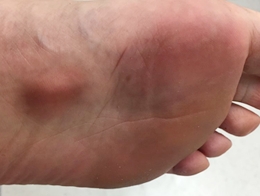Hot Feet
Why do I get Hot Feet at Night?

The feet are the most peripheral parts of the human body, distant from the center of the circulatory system (the heart) and the central nervous system (brain and spinal cord). Nerves and blood vessels need to travel a long way towards the feet area, and that is why the changes in these and other organ systems can be noticed in the feet region first. Hot feet and the sensation of continuous or intermittent warmth in the feet area is a very common complaint in every doctor’s office, and it can be associated with several different causes. They are ranging from very mild disorders to very severe diseases affecting multiple organs and organ systems. Here are some of the most important things you should know about hot feet.
Causes of Hot Feet
Diabetes
Sensations of hotness in the feet area often appear in persons suffering from disorders affecting the peripheral nervous system, such as diabetes mellitus. Basically, due to lack of insulin (type 1) or decreased sensitivity of insulin receptors to insulin (type 2), the glucose remains in the blood, while the cells remain “hungry”. In this way, diabetes causes peripheral neuropathy, which is usually first manifested in the feet as warm sensations, numbness, tingling, or other strange sensations which suggest some disruption in the innervation.
Lyme disease
Lyme disease is caused by a spiral bacteria Borrelia Burgdorferi which also attacks the human nervous system and it is transmitted by ticks. During the third stage of this disease, the indicators of some level of neural damage, such as hot feet are very likely to appear. Lyme disease is a very severe disorder if it reaches the third stage. During the first and the second stage, it is completely curable.
Alcoholic neuropathy
Long-term alcohol abuse can cause a disorder called alcoholic neuropathy. It is another disorder affecting the most peripheral part of the body first – the feet. Ethanol is a small molecule which easily passes through all barriers, including the nerve tissue, so the alcoholics are in a great danger of producing permanent damage to their central and peripheral nervous system.
All of these disorders related to neural damage can be very irritating and disabling. Experiencing hot feet before going to sleep can prevent a person from a good night rest which is necessary for daily activities. Additionally, the vicious circle which starts with the underlying disorder is further propagated by the lack of sleep. Variations in body temperature during some infectious diseases can cause hot feet at night.
High Blood Pressure
Long term high blood pressure causes the aggravation of the atherosclerotic process in the blood vessels. Small blood vessels in the feet are also affected and that can cause various sensations, including hot feet.
Other Causes
Other possible causes of hot feet are related to the pressure applied to the feet area. Of course, running, especially in overweight persons can result in the inflammation of the heels and even foot joints. In obese individuals, these symptoms can be noticed even after waking. Hot feet during pregnancy appear for the same reason and the additional swelling of the feet, which can occur in some pregnant women. One of the most common autoimmune diseases called Systemic Lupus Erythematosus often affects the hands and feet, causing all kinds of different sensations on the skin surface.
Symptoms of Hot Feet
When assessing the symptoms related to feet, such as hot feet, it is necessary to take into account all the other associated symptoms which can altogether help to make the right diagnosis. For example, persons with diabetes will certainly have other symptoms for months or even years before developing hot feet. These symptoms include excessive hunger, thirst, frequent urination, and chronic fatigue. It is important to mention that if diabetes is properly managed, there will be no such symptoms or consequences.
An interesting thing about the Lyme disease is that it does not produce too many symptoms until it reaches the advanced stage. Peripheral neuropathy can be recognized by the vegetative changes in lower legs and feet, such as redness of the skin, and hair loss. Pain can accompany these symptoms, but not necessarily, while tingling, numbness, and irritation are almost always present.
Persons who experience peripheral neuropathy for any of the above reasons can also have an issue with mechanical damages of the feet as their perception of pain is not adequate. To better understand this, take the fact that persons with advanced unmanaged diabetes often feel no pain, even during heart attack!
Alcohol abuse produces a broad range of symptoms, but the symptoms related to neurological damage, such as hot feet, often appear while trying to withdraw from alcohol without professional help. This is a mistake many alcoholics make, and besides localized neurological symptoms, they can even experience epileptic attacks.
If besides hot feet you also experience frequent headaches, tinnitus, nervousness, and insomnia, you should check your blood pressure. Increased blood pressure can cause all these symptoms. Hot feet will rarely be the only symptom of this chronic disorder. Persons with the advanced stage of atherosclerosis will also feel the pain during physical activity in the lower legs and feet due to lack of blood flow. This phenomenon is called intermittent claudication.
Autoimmune diseases, such as lupus produce a broad range of symptoms coming from many organs, but they very commonly affect the feet and hands. In fact, this is one of the disorders where hot feet, pain, or swelling in the feet area can be a first sign of the disease.
Hot flushes are very common during menopause and perimenopausal period, and in some women, they can be localized to the feet area.
If your hot feet issues are associated with taking certain food and upset stomach, you should consult your doctor in order to investigate possible food allergy or sensitivity to gluten. Gluten enteropathy is often associated with subtle neurological symptoms, such as weird sensations in the feet area.
Treatment for Hot Feet
As you can see, hot feet have a very wide spectrum of causes, so the treatment will also depend on the specific cause. The underlying chronic diseases, such as diabetes and high blood pressure can be kept under control using the appropriate medication. For autoimmune disorders, corticosteroids are commonly used. Lyme disease is treated with the appropriate antibiotics.
Home Remedies
- There are some home remedies which can be used for less severe causes of hot feet, such as hormonal imbalance during menopause and superficial mechanical injuries. For women with mild menopausal symptoms, mastering yoga relaxation techniques can be very beneficial. Yoga is also helpful for stress release, and it is recommended in persons with high blood pressure and autoimmune diseases.
- If you know that your hot feet issue stem from some mechanical cause, try to avoid running and applying of any excessive weight to your feet until the symptoms subside. Soak your feet after running in water solution of sea salt in order to improve healing.
- If you have some form of foot deformity which contributes to your symptoms, you can try walking outside barefoot during summer or doing some simple exercises to strengthen your muscles and tendons and avoid the reoccurrence of the symptoms.





